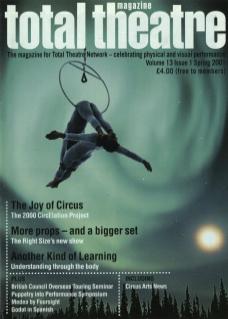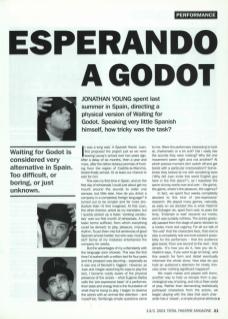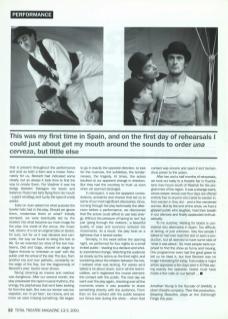It was a long wait. A Spanish friend, Juan, first proposed the project just as we were leaving Lecoq's school over two years ago. After a delay of six months, then a year and more, after the rather dubious promise of funding from the region of Castilla-la-Mancha, Godot finally arrived. Or at least our chance to wait for him.
This was my first time in Spain, and on the first day of rehearsals I could just about get my mouth around the sounds to order una cerveza, but little else. How do you direct a company in a completely foreign language? It turned out to be simpler and far more productive than I'd first imagined. At first Juan, the other director, acted as my translator, but I quickly picked up a basic working vocabulary over our first month of rehearsals. A few basic terms sufficed, from which everything could be derived: to play, pleasure, impulse, rhythm. To put them into full sentences of good Spanish proved harder, but who was I trying to kid? Some of my mistakes entertained the company for weeks.
But the advantages of my unfamiliarity with the language soon showed. This was the first time I'd worked with a written text for four years and the prospect was daunting – especially as it was one of Beckett's 'biggies'. However, as Juan and I began searching for ways to play the text, I became vividly aware of the physical presence of the actors – what Eugenio Barba calls the 'pre-expressive base’ of a performer, their state and energy that is the foundation of what they're trying to play. I began to observe the actors with an animal-like attention and myself too. Terrifyingly simple questions came to me. Were the performers interesting to look at, charismatic or a bit dull? Did I really like the sounds they were making? Why did one movement seem right and not another? At which precise moment did I switch off and get bored with a particular improvisation? Sometimes they looked at me with wondering eyes (‘Why did Juan invite this weird English guy here in the first place?'), as I repeated the same clumsy words over and over – the game, the game, where's the pleasure, the urgency?
In fact, we spent four weeks completely devoted to this kind of pre-expressive research. We played many games, naturally, as early on we decided this is what Vladimir and Estragon do, apart from wait, to pass the time. 'Entertain or wait' became our motto, and it was suitably ruthless. The actors gradually passed from the stage of panic-stricken to a cooler, more real urgency. For all our talk of ‘the void’ that the characters face, that void is also a completely real and ever-present possibility for the performers – that the audience gets bored. From one second to the next, that simple. It's how you do it, how you do it, Vladimir says, if you want to go on living, and this search for form and detail eventually informed the whole show. How else do you hold an audience's attention for ninety minutes when nothing significant happens?
Waiting for Godot is considered very alternative in Spain. Too difficult, or boring, or just unknown.
We made masks and played with them, another way to help us escape from a psychological way of acting, and into a freer world of play. Rather than demanding realistically portrayed characters from the actors, we began playing with the idea that each character has a vessel, a simple physical attribute that is present throughout the performance and acts as both a form and a motor. Fortunately for us, Beckett had indicated some clearly, but as always it took time to find the way to create them. For Vladimir it was his dodgy bladder; Estragon his boots and balance; Pozzo had farts flying from his mouth – a giant windbag; and Lucky the eyes of a telly addict.
Early on Juan asked me what purpose the bowler hats had in the play. Should we ignore them, modernise them or what? Initially stumped, we were eventually led by the bowlers into what became our main image for the play: the world of the circus, the music hall, clowns. It's not an original take on Godot, for sure, but for us it was decisive and concrete, the way we found to bring the text to life. So we invented our story of the two has-beens, Didi and Gogo, shoved on stage by Signor Antonio to 'entertain or wait' with the public until the arrival of the star. The duo, from another era and now pathetic, constantly on the edge of the flop, live the tragicomedy of Beckett's joke: Godot never shows.
Taking clowning as means and method was dangerous. After our second month, the play possessed the rapid musical rhythms, the energy, the playfulness that we'd been looking for from the start. But now our version was too slapstick, too 'in yer face', too clowny, and we knew we were missing something. We began to go in exactly the opposite direction, to look for the nuances, the subtleties, the tendernesses, the tragedy. At times, the actors baulked at our apparent change in direction. But they had the courtesy to trust us even when we seemed deranged.
In retrospect, it was the apparent contradictions, accidents and chance that led us to some of our most significant discoveries. Once, running through the play technically the afternoon before a performance, we discovered that the actors could afford to use less energy. Without the pressure of having to 'act' but just ‘going through the motions', a beautiful quality of ease and economy entered the movements. As a result, the play took on a lightness that it lacked earlier.
Similarly, in the week before the opening night, we performed for four nights to a small invited public – leading to a decisive and wholly unpredicted change. Watching the audience as closely as the actors on the third night, and wondering about the relation between the two, I realised what was lacking. For weeks we'd talked a lot about clown, but in all the technicalities, we'd neglected the crucial element: the contact with the public. The next day we went over the play again, checking over all the moments where it was possible to share something directly with the audience. From then on the contact with the public became our litmus test during the show – when that contact was sincere and open it lent tremendous power to the action.
After two and a half months of rehearsals, we took our baby to a theatre fair in Puertollano (two hours south of Madrid) for the programmers of the region. It was a strange event, where sixteen shows over four days are offered entirely free to anyone who cared to wander in. And wander in they did – and a few wandered out too. But by the end of the show, we had a gripped public who laughed, held their breath in our silences and finally applauded enthusiastically.
To my surprise, Waiting for Godot is considered very alternative in Spain. Too difficult, or boring, or just unknown. Very few people I talked to had ever read the text or seen a production, but all seemed to have some idea of 'what it was about'. So most people were surprised to find the show so funny and moving. One programmer even had the good grace to tell us he liked it, but that Beckett was no longer interesting for today. Fortunately a major article appeared a few days later in El Pais saying exactly the opposite. Godot must have made a few calls on our behalf...
Jonathan Young is the founder of Shams, a clown theatre company. Their first production, Sleeping Beauties, plays at the Edinburgh Fringe this year.


